Wampanoags speak out on the DHS Indians mascot
Wampanoag Tribe of Gay Head Aquinnah Chairwoman and DHS alumna Cheryl Andrews-Maltais pictured in the Class of 1977 DHS yearbook.
The controversy over Dartmouth High School’s Indian mascot has become increasingly controversial, largely due to a bill introduced in the Massachusetts legislature to ban public schools from using any Native American team name, mascot, or logo. Over the years, people have disagreed whether or not the mascot should be changed at DHS. Opinions range from the mascot being an offensive and dehumanizing view towards American Indians, to those who believe it commemorates the original inhabitants of our country. The constant battle whether to keep tradition or replace the mascot remains divided.
Across the country, there has been an uptick in people speaking up for themselves or other groups of people who have been discriminated against or marginalized in society. In the Dartmouth Indians case specifically, many non-American Indian residents have been theorizing how Wampanoags feel about our mascot. However, nobody has asked tribal members if it’s specifically offensive to them.
As sophomore Jaeda Walker said, “People who are claiming it’s racist have no American Indian background.” Dartmouth residents are missing the Wampanoag perspective. How do they feel about our team mascot? Does our mascot offend them?
As chairwoman of the Wampanoag Tribe of Gay Head Aquinnah and DHS alumna Cheryl Andrews-Maltais said, “Ironically, the people complaining aren’t even natives.”
Ms. Andrews-Maltais was recently named Woman of the Year by National Indian Women.
In Massachusetts, the Wampanoag tribe consists of the Mashpee Wampanoag Tribe and the Wampanoag Tribe of Gay Head. The Mashpee Wampanoag tribe is the closest federally recognized tribal group to Dartmouth. There hasn’t been a specific answer in decades as to whether actual tribal members find the Dartmouth Indian mascot offensive or not.
Cheryl Andrews-Maltais graduated from DHS in 1977. Ms. Andrews-Maltais’s family was on the town tribal board in Dartmouth, and she recalls they were the only Wampanoag Tribal members in the school. When Ms. Andrews-Maltais was a student, the old mascot was an inaccurate depiction of Wampanoags. The previous mascot was of a tribal Indian that originated from the South, rather than of a Wampanoag Indian. This led her family to request and then design the new mascot that is still used at DHS today.
In the mid 1970s, the school board took into consideration the incorrect representation, and replaced it with an accurate representation of a Wampanoag Tribe Indian. This was in an effort to correct and show respect to the authenticity of this tribe.
When Ms. Andrews-Maltais was a student at DHS, she felt honored and respected, rather than the opposite. “My family was being recognized for who we were. I took it with good spirits and didn’t find it offensive,” she said.
She also added, “If they are using stereotypical types of characters and music, then it becomes offensive.”
Other members of the Wampanoag Tribal group agree with Ms. Andrews-Maltais.
A member of the Wampanoag Tribe of Mashpee said, “I don’t find it offensive as long as it comes with respect. If it’s not making our name look bad, then I don’t see a problem.”
Mashpee Wampanoag Tribal member Aaron had the same reaction. Aaron attended Middleborough High School, which is known for its “Sachem” mascot. When attending Middleborough High School, Aaron said, “I never necessarily found it offensive. I found it represented us more than did the opposite.”
If the school committee is discussing issues about members of the Wampanoag Tribe, why has a board been formed without known communication to the tribal members?
History Teacher Megan Lizotte, who is a DHS alumna, said, “It is definitely important to have perspective on someone who it is actually affecting. There are still plenty of Wampanoag members in the area.”
Ms. Andrews-Maltais agrees. “Hopefully we [the Wampanoag Tribe] can hear back from the town if there is a committee board set in place,” she said.
Wampanoag Tribal members don’t speak for all American Indians in America. The Wampanoag tribe represents this region and the Dartmouth Indian represents the strength of the native people. Although Ms. Andrews-Maltais doesn’t agree with the word “mascot,” she believes the Dartmouth Indians represent who the American Indians are.
“We are not mascots, we are not mythical characters. We are strong warriors,” said Ms. Andrews-Maltais.


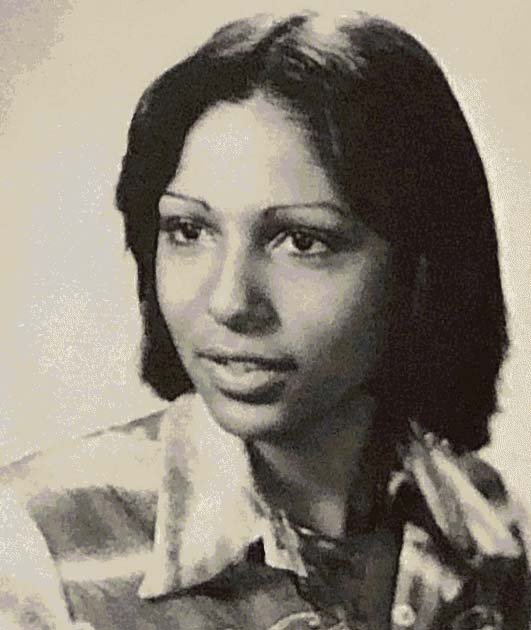

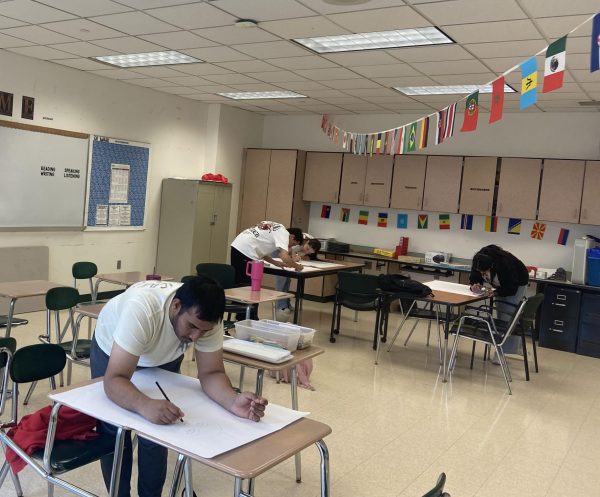
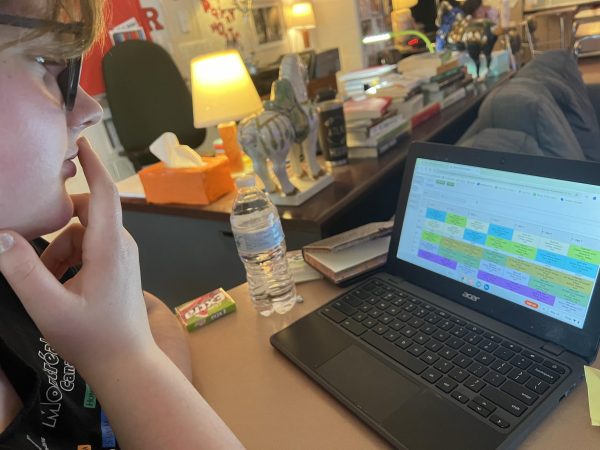

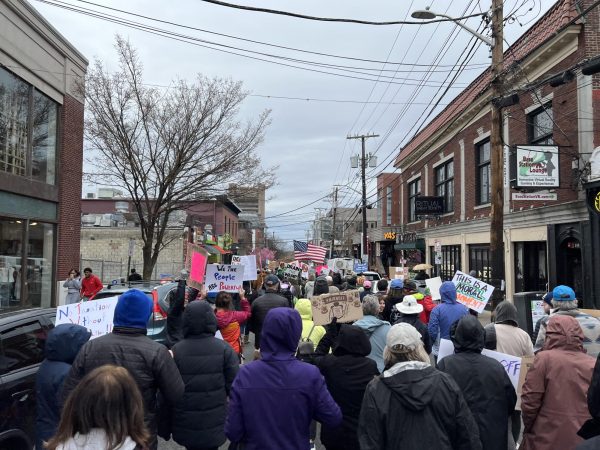
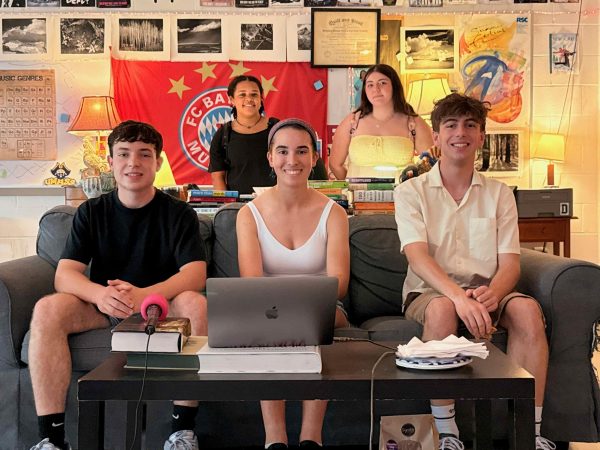
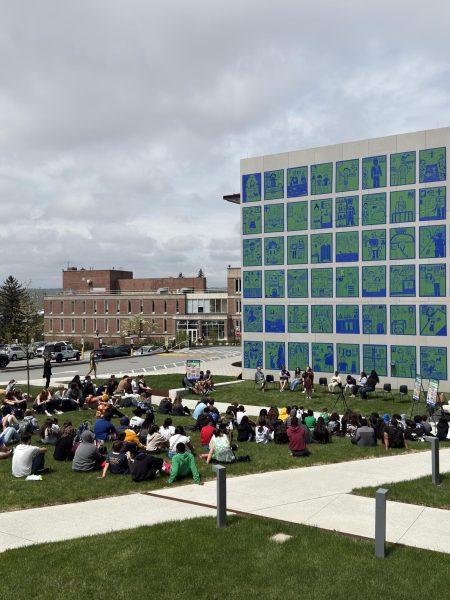
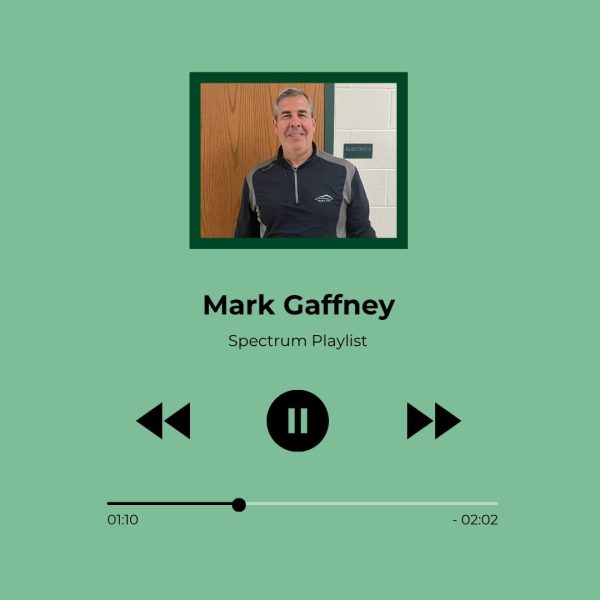

Joanne M Maura • Mar 25, 2021 at 5:05 pm
I’m a 1970 grad; always been proud of our Indian logo, but if i thought for a minute that it offended Native Americans in our area, I would probably feel bad and maybe want to change it to something more acceptable to OUR Native Americans. But I think a lot of these protestors are ACLU who stand to make money off lawsuits, maybe we should change it from Induans to Dollar Signs??
durwood • Oct 25, 2019 at 2:40 pm
I appreciate that it’s really hard to see or understand the negative consequences of a symbol that has become a tradition for Dartmouth, MA. But there are many others in the local Wampanoag and American Indian community that hold differing points of view about “Indian” mascots than those expressed in this article. When someone tells you that something is offensive to them, it doesn’t mean that everyone of that ethnicity or social group must share the same point of view. It’s still offensive to those that feel it’s offensive.
Suzanne • Oct 23, 2019 at 7:54 am
Nice job, Juliana! This is really good writing and it’s awesome that you investigated this topic so well. I think Dartmouth needed the opinions of the Wampanoag tribe members because we were deciding for them what to feel about this. It’s really cool that you talked to them about this issue so Dartmouth can better decide what to do about this.
Ava • Oct 23, 2019 at 7:51 am
You did a great job writing this article, and people are going to really love seeing the Wampanoag’s opinions on this topic.
Karissa da Silva • Oct 23, 2019 at 7:50 am
Great job! Very well written an I can see how much effort you put into this article.
Elizabeth • Oct 23, 2019 at 7:50 am
This was a really good article! I enjoyed hearing the Wampanoag perspective, and the way Juliana wrote about the issue was articulate and interesting.
Lexi • Oct 23, 2019 at 7:49 am
Good article, nice to hear from someone who has authority speak out about this issue.
Judith Robinson • Oct 23, 2019 at 12:47 am
Nice article, Juliana. I was and always will be a Dartmouth Indian and I am proud of it! Thanks to Cheryl Andrews for her sincere remarks. I remember Cheryl as an excellent student, a wonderful young lady and an outstanding role model. She is more than qualified to speak on this topic and her opinion should carry much weight.
Chris • Oct 22, 2019 at 5:19 pm
You need to get over your mascot issues people. It shouldn’t mean much to you. Nobody ever cared while in school. Now because it’s the right thing to do to drop it you all act like you were waving a flag or something. It’s an insult to the people that were here to begin with and if you can’t understand try again. Such selfish self absorbed people whining about a friggin picture nobody ever cared about. Try caring about the people it insults for a change.
Gina Rizzuto • Oct 22, 2019 at 2:28 pm
I’ve lived in South Dartmouth pretty much my whole life I went to Joseph demello,Dartmouth middle and Dartmouth high school it is very disheartening to me that any one feels that we are dishonoring or demoralizing Indian tribes in any way I was always proud to be proud of belonging to the Dartmouth Indians Dartmouth was representing our Indian history I’m proud to wear a Indian on my shirt I represent both history and Dartmouth please leave it alone it’s part of Dartmouth history it’s not just a logo
Carol Ferreira • Oct 21, 2019 at 3:58 pm
I graduated from DHS in 1967 and my mom used to Drive us kids in the back of our stake body truck with the Indian logo painted on the sides we were so proud of that indian
Great article thank u for sharing
John taylor • Oct 21, 2019 at 2:38 pm
Why was the current mascot not shown with the article? Does the current (sometimes misguided) “PC” climate have this publication running scared?
Cherry Rupkus • Oct 21, 2019 at 10:51 am
I couldn’t have said it better. I feel the Dartmouth Indians should say. I when to that school and was very proud of that name. They should keep the name Dartmouth Indians. There nothing wrong with it.
Tracy Furtado • Oct 21, 2019 at 8:59 am
DHS Alum, wonderful article. I agree , we should be asking local tribes. It’s not for us to say what’s offensive to them, though I think there’s worse than Indians. I always thought we were trying to honor them and our history with them here in Dartmouth. I had read about the change to how our mascot looked (way before my time) and glad we did it, to properly represent them. I’m sure Dartmouth would be happy to change but only if the native Americans wanted it and they are not the ones pushing it!!
Linda Heys • Oct 21, 2019 at 8:23 am
Very nice article and after reading it I think the Indian should remain. It is great that this was all under taken in the mid seventies and the school board actually revised the mascot to honor the Wampanoag tribe .
Shirley Reynolds • Oct 21, 2019 at 3:38 am
I am of the Pokanoket Tribe a descendent of Quadequina I say keep your Dartmouth Indian in case you don’t know who the Pokanokets are we welcomed the Pilgrims
Keela bryant • Oct 20, 2019 at 10:55 pm
I graduated in 72. My grandfather was from the abanaki tribe from Maine. I have always been proud of my Native American heritage. I am nor have I ever been offended by the DHS Indians
Jeff Farias • Oct 20, 2019 at 9:53 pm
Was proud to wear that emblem at DHS.
Thanks to Ms. Souza for this thoughtful article.
Lawrence Gil • Oct 20, 2019 at 8:21 pm
Absolutely the first cogent answer to the issue. Just ask the tribe(s) memberships native to the area what they think.
Betsy Freeman • Oct 20, 2019 at 5:56 pm
Thank you for that thoughtful,comprehensive discussion from your point of view.Edith and Mark. Represented your tribe so well.
Robert Almeida • Oct 20, 2019 at 5:41 pm
I am extremely proud of being an alumni of Dartmouth High and extremely proud of the heritage we represented and still do. I will always be a Dartmouth boy and love the logo we represent. This should be laid to rest and kick the bums out of office who portend to represent us. They are clueless as how we all feel about our teams and the tribe we represent. They are good people and deserve the honor they deserve.
Susan Mello • Oct 20, 2019 at 2:29 pm
This is an amazing article….Great job Juliana!!!!
Diogo • Oct 20, 2019 at 12:56 pm
Great job Juliana!
Kaitlyn • Oct 20, 2019 at 12:21 pm
This article is spectacular and well written! Juliana Sousa must be famous!